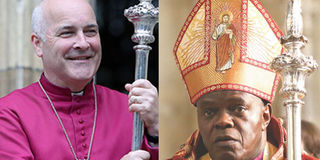Anglican Church must confront all aspects of its past, says leader

Stephen Cottrell (left), 61, takes over from Britain's first black archbishop John Sentamu (right) who fled Uganda and became a leading voice against racial injustice
The leader of the worldwide Anglican communion on Thursday called on followers to acknowledge all aspects of the Church of England's past, both good and bad, as his new number two was sworn in with little of the usual high ceremony.
Archbishop of Canterbury Justin Welby said followers had to confront the church's troubling historical "baggage" as they looked to make a better future.
The Church of England's highest-ranking cleric was speaking in a virtual ceremony to mark the formal election of Stephen Cottrell as the 98th Archbishop of York.
The Church of England, established in 1534 after king Henry VIII's split from Roman Catholicism, last month apologised for its links to slavery, calling it a "source of shame".
The apology came against a backdrop of anti-racism protests in Britain and across the world, sparked by the death during the police arrest of an unarmed black man, George Floyd, in the United States.
Welby said the Church's past included both "saints and slave traders".
"Living as Christians requires us to live not only in fellowship with Christians around the world but also with the Church throughout time," he said.
"With the Church of England, we know that some of those bring baggage. We find saints and slave traders, the proud and prelatical, with the humble servant of the people.
"They are part of us, of our inheritance, to be reformed, to be repented of, to be imitated."
Churches across Britain have been shut since late March because of the coronavirus outbreak, forcing services to be held online.
Restrictions are gradually being eased, but remain in place for large church services.

Archbishop of Canterbury Justin Welby
Open doors
Measures to halt the close-contact spread of the virus have forced the postponement of Cottrell's enthronement but one aspect was retained in the ceremony.
After receiving his archbishop's crozier, he ceremonially banged three times on the west door of York Minster, the northern English city's imposing Gothic cathedral.
The doors were then opened to symbolise the Church being open to all.
The 61-year-old takes over from Britain's first black archbishop John Sentamu who fled Idi Amin's Uganda and became a leading voice against racial injustice.
Cottrell, who was previously Bishop of Chelmsford in southeast England, has previously promised to use his new role to help soothe divisions following years of political turmoil over Britain's departure from the European Union.
He has also said he hoped to "address the discrepancies of wealth and opportunity", including working with government to rejuvenate northern England.
He said he was daunted but excited about taking up the position, which dates back to Saint Paulinus in the year 627.
And he called for the lessons of the coronavirus outbreak to be learned, "to build a better world, a fairer world, a more just world... where status and privilege don't count so much, where everybody has an equal opportunity".
"We want this (pandemic) to end but we don't want to be back to normal," he added.




